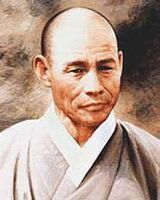Han Yongun
| PersonType | Category:Ordained (Monks and Nuns) Category:Other Authors |
|---|---|
| MainNamePhon | Han Yongun |
| MainNameTib | 한용운 |
| SortName | Han Yongun |
| bio | Han Yongun. (한용운) (1879-1944). Korean monk, poet, and writer, also known by his sobriquet Manhae or his ordination name Pongwan. In 1896, when Han was sixteen, both his parents and his brother were executed by the state for their connections to the Tonghak ("Eastern Learning") Rebellion. He subsequently joined the remaining forces of the Tonghak Rebellion and fought against the Chosǒn-dynasty government
but was forced to flee to Oseam hermitage on Mt. Sǒrak. He was ordained at the monastery of Paektamsa in 1905. Three years later, as one of the fifty-two monastic representatives, he participated in the establishment of the Wǒn chong (Consummate Order) and the foundation of its headquarters at Wǒnhǔngsa. After returning from a sojourn in Japan, where he witnessed Japanese Buddhism’s attempts to modernize in the face of the Meiji-era persecutions, Han Yongun wrote an influential tract in 1909 calling for radical changes in the Korean Buddhist tradition; this tract, entitled Chosǒn Pulgyo yusin non ("Treatise on the Reformation of Korean Buddhism"), set much of the agenda for Korean Buddhist modernization into the contemporary period. After Korea was formally annexed by Japan in 1910, Han devoted the rest of his life to the fight for independence. In opposition to the Korean monk Hoegwang Sasǒn's (1862-1933) attempt to merge the Korean Wǒn chong with the Japanese Sōtōshū, Han Yongun helped to establish the Imje chong (Linji order) with its headquarters at Pǒmǒsa in Pusan. In 1919, he actively participated in the March First independence movement and signed the Korean Declaration of Independence as a representative of the Buddhist community. As a consequence, he was sentenced to three years in prison by Japanese colonial authorities. In prison, he composed the Chosǒn Tongnip ǔi so ("Declaration of Korea’s Independence"). In 1925, three years after he was released from prison, he published a book of poetry entitled Nim ǔi ch'immuk ("Silence of the Beloved"), a veiled call for the freedom of Korea (the "beloved" of the poem) and became a leader in resistance literature; this poem is widely regarded as a classic of Korean vernacular writing. In 1930, Han became publisher of the monthly journal Pulgyo ("Buddhism"), through which he attempted to popularize Buddhism and to raise the issue of Korean political sovereignty. Han Yongun continued to lobby for independence until his death in 1944 at the age of sixty-six, unable to witness the long-awaited independence of Korea that occurred a year later on August 15th, 1945, with Japan's surrender in World War II. (Source: "Han Yongun." In The Princeton Dictionary of Buddhism, 344–45. Princeton University Press, 2014. http://www.jstor.org/stable/j.ctt46n41q.27.) |
| Other wikis |
If the page does not yet exist on the remote wiki, you can paste the tag |

